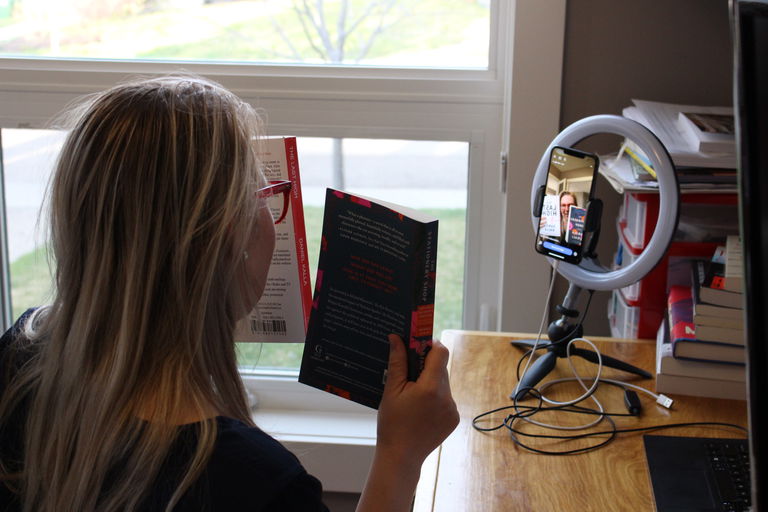
Strangers and Fiction
Anne Logan for Culture Days
Sep 2, 2020
As the Coronavirus restrictions gradually settled over my life in mid-March and my regular book club was put on hiatus, I found myself craving an arts-focused connection…
As the minutes tick towards 7pm, my computer is perched precariously on a stack of books while pages of discussion prompts lie on the desk underneath a dog-eared copy of our May book choice. The Facebook video interface is poised for recording; all I have to do now is hit the ‘Go Live’ button to begin our meeting. The 7pm MST beginning is late for some of our members in eastern Canada, but the promise of a satisfying deconstruction of our latest read is enough to pull people back to their devices at this hour. Once I begin the recording there is little preamble, I pause only to thank people for joining before I jump right into the discussion. After the requisite 40 second delay in the video feed, comments begin pouring in: a whole month’s worth of observations scrolling down the screen.
There are two different kinds of book clubs. The first is an informal gathering of friends, eager to indulge in some libations and friendly gossip with some limited book talk thrown in. The second is a formal club with a regular meeting time, specific book choices voted on in advance and a discussion focused solely on the chosen reading material. Quite often the latter is made up of strangers, brought together over a love of the written word and a desire to meet like-minded people. Now, while in-person gatherings are on hold due to the COVID-19 pandemic, attention is shifting to online groups as an accessible and efficient way of connecting those with similar interests.

As the Coronavirus restrictions gradually settled over my life in mid-March and my regular book club was put on hiatus, I found myself craving an arts-focused connection. As a critic I’m lucky enough to have books mailed directly to my home, so I invited fellow bookworms to join me in reading through my collection by starting the Ivereadthis Online Book Club. The Club is a free and public Facebook group, connecting once a month over live video chats which allow for real-time discussion with an unlimited number of participants. As I write this our group includes over 200 members, but after only two meetings it is clear who will actively participate in our video chats and who is content to hover on the sidelines, popping in and out for book recommendations.
Face-to-face interactions ensure a certain level of decorum is upheld while online discussions can easily devolve into bickering. As the group moderator I was mildly concerned that our conversations may become offensive, or worse, trolled by people looking to stir up pointless controversy. To avoid this, I decided our group would focus on works of fiction which allow people to voice opinions on issues external to their own lives, but relevant all the same. For example, character motivations are a frequent topic of discussion; why did someone act that way, were they justified in lashing out, what would you have done in the same situation? Criticizing the actions of a character tends to incite less controversy, keeping the tone of our discussions light and entertaining regardless of the dark subject matter the chosen books may address.

Despite the ease of voicing one’s thoughts to strangers across the country in sweatpants, there are obvious downsides to staying solely online. Fran Kimmel, a writer and book club veteran points out: “when online I might not try quite as hard to get my point across or to understand other people’s points. There’s the added layer of technology separating you from others, and all those emotional intelligence cues we get through body language are stripped away. But I’m also hopeful that this is a learned skill, and the more we meet online, the better we’ll become at sharing deeply.”
The only distinguishing factor of each group member is their thumbnail-sized picture, so there is a distinct lack of background information to base judgements on. If someone voices an opinion that you vehemently disagree with at an in-person meeting, you are likely to fall back on their body language and tone of voice to help justify their comment. Online we can only go by a person’s text-based contributions—so although it seems easier to participate in a virtual chat, our words hold more weight than usual. Readers are especially aware of how important word choice can be, so thankfully our conversations have remained respectful and empathetic, even during disagreements.
As the organizer, my one question that looms above all others is the likelihood this club will continue. COVID-19 has not only shifted the way we currently interact with others, it has altered the way we imagine our future communications; the ease in which we have shifted our events online demonstrates this new way of meeting can continue even when moving restrictions have lifted. And even if the membership of the Ivereadthis Online Book Club slowly dwindles once life returns to normal, members now see the benefits to joining other public clubs like this in the future. One of the group’s members, Jolena, confirms this newly discovered interest is one she’ll continue with: “I would join another book club, it was a great experience to be able to discuss a topic among peers.” Knowing our members feel this way is incredibly validating—the cultural richness of literature is a wonderful gift to share with others, especially with those you never would have met otherwise.

This article is part of a special blog series featuring writers and creatives from across Canada with stories that both highlight and celebrate Culture Days’ 2020 theme of Unexpected Intersections. Explore more intersections below:
- Theatre x Sport: Until the Lights Go Out by Taylor Basso
- Indigenous Storytelling x Digital Media: “People are Finally Listening”–Indigenous Animation Rises Up by Chris Robinson
- Academia x Creativity: Building 21: Make zines, not research papers by Greta Rainbow
- Poetry x (Natural) Environment: Listen to the River: An Ode to the Columbia River by Saba Dar
- Teahouse x Activism: Chinatown’s Living Room: The gathering place for a budding activist community by Anto Chan
- Traditional Craftsmanship x Youth Outreach: At the Maritime Museum of the Atlantic, They Build More Than Boats by Aleen Leigh Stanton
- Visual Arts x Science: What happens when you mix an artist, a scientist and a very bright light? by Vivian Orr




